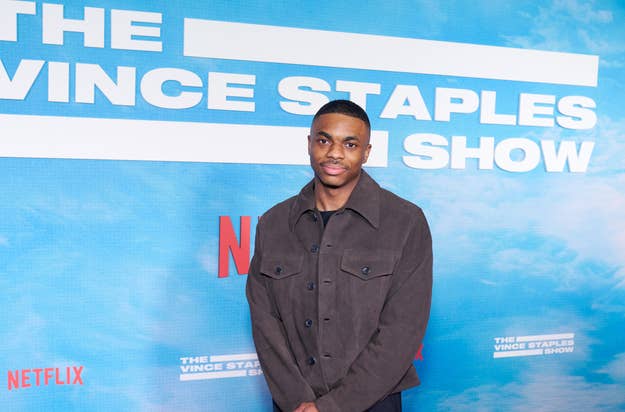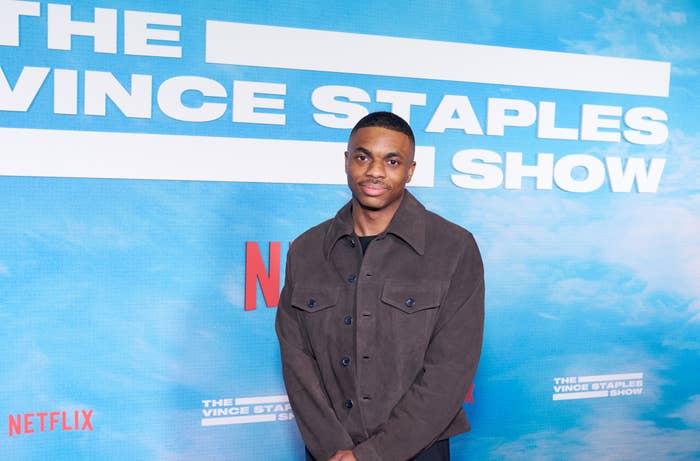
Vince Staples can now add TV creator to his résumé.
After landing smaller roles in Abbott Elementary and White Men Can't Jump, he has now transitioned into writing, producing, and starring as the lead in his new Netflix series, The Vince Staples Show.
The first season of the comedy follow Staples in his day-to-day life in Long Beach, California. Yes, he might be famous and rich, but that doesn't stop him from encountering his fair share of trouble, shenanigans, and madness. In the first episode, "Pink House," Staples gets arrested, and while in jail, he meets an eager fan who is also a musician. Staples tells him he's not into music as much anymore, but he says acting is also not his priority.
"I’m just living life, you know, just kind of day-to-day life and making sure that you can live the best quality of life as possible, emotionally and mentally, because that infers the things that you create," Staples says during a sit-down conversation with Complex. "If I'm not right in my day-to-day life, I can't give the world decent things. So I focus on that."
Developing The Vince Staples Show has been a lengthy 10-year process for the rapper. He says having someone like Kenya Barris, who is an executive producer on the show, on his team helped him figure out the politics of television, while also giving him guidance and the space to do things his way. "He didn't over-impose; he didn't try to make my vision a vision that he would do, which is natural for us to do as people," Staples says. "It takes good leadership to not interact with people in that way because it's extremely hard to see it from their vantage point."
Staples was heavily involved in casting—which features an appearance by Rick Ross, Vanessa Bell Calloway as Vince's mom, Arturo Castro, and more—and infused the show with themes from his own experiences and societal observations. He also drew from various sources of inspiration, from HBO's Barry to the Coen Brothers movies to The Simpsons, and Staples said he spoke to Donald Glover and his team often while creating the show.
Whatever the inspiration was, it worked. The show's second episode, "Black Business," is one of the most hilarious, clever and dynamic episodes to hit TV this year. In the episode, Staples gets rejected for a small business loan at a bank because he's a rapper, and he then finds himself in the midst of a bank robbery executed by his friend Timothy (Myles Bullock). Staples goes on a journey to discover that the bank had ties to slavery, and realizes that not much has changed since.
That's just a taste of what's in store with Netflix's latest comedy. The show has a concise five episodes, but Staples says that it was done purposely in hopes that it will make fans demand a second season. Staples sat down with Complex to speak about his inspiration behind his new show, how he represented Long Beach, and how he put the cast together.
This interview has been edited for length and clarity.
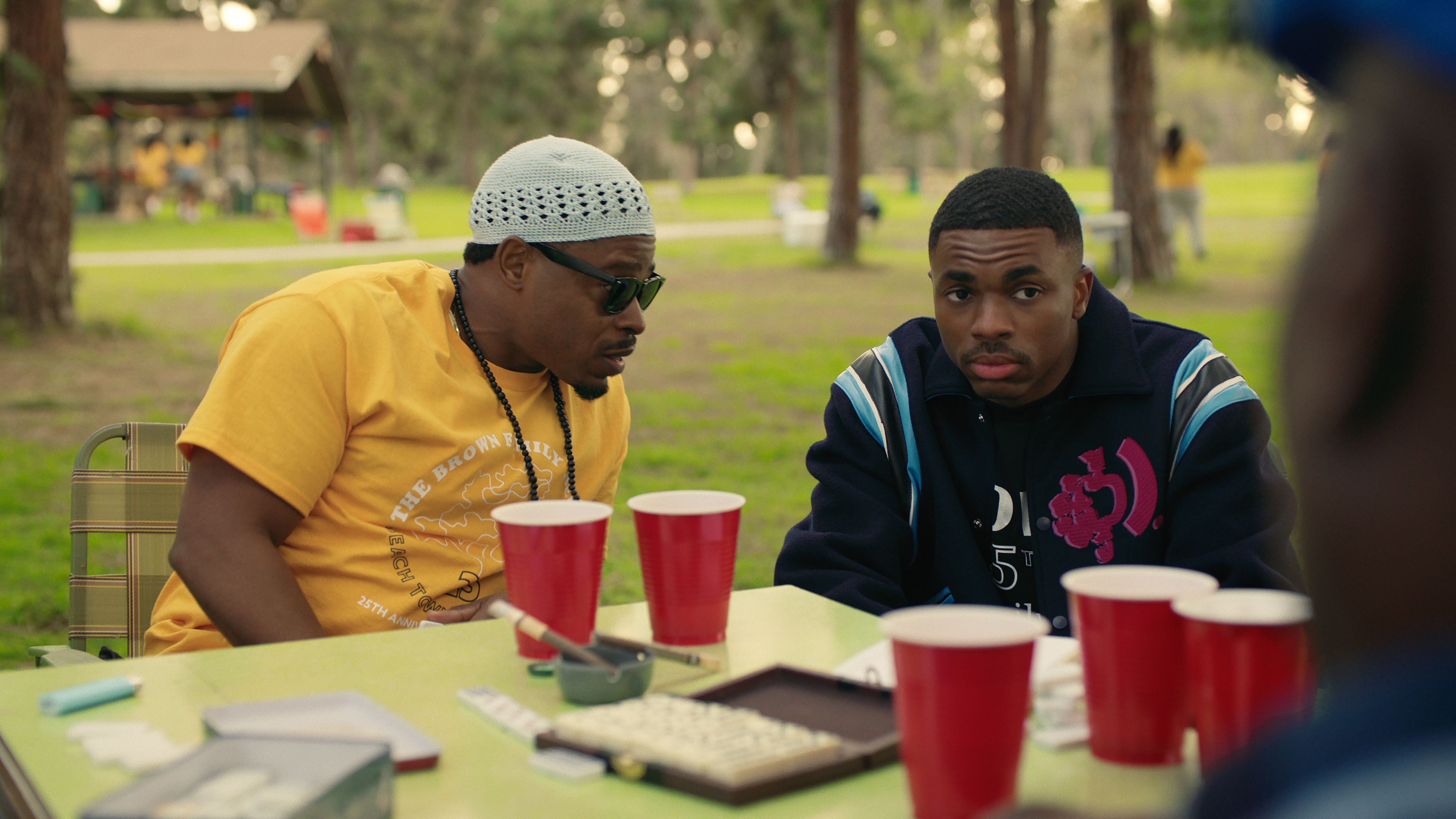
Congratulations on the show. How are you feeling about seeing your face all over the billboards?
Honestly, I don't really go anywhere where the billboards are. [Laughs.] So when I did the first teaser for the show, it was cool; it was interesting. I’ve had [billboards] for other things, but for this it’s refreshing. Especially because I don't think about it in my day-to-day life, so it was kind of a good reminder of the work we’ve put in.
You've been acting a lot lately. You've been on Abbott Elementary and White Men Can't Jump. How has it been different to do this show as the lead as opposed to being a supporting character on the show?
It's extremely different. This was less about the acting portions of it and more so about the creation of the show as far as the writing and producing elements—that's the biggest difference. The acting is pretty similar. I haven't had really any big roles outside of this, as far as shoot days and commitments and things like that. So it's been pretty easygoing.
I wanted to make sure I didn't have to do too much on the acting side because the idea, the format of the show were more so about me making it than me being in it. It really is kind of more about the other characters. So that was the easy part, but the other stuff was pretty heavy.
In the first episode “Pink House,” you say that music is not really your priority right now. Would you say acting is now your main focus?
Not at all. I’m just living life, you know, just kind of day-to-day life and making sure that you can live the best quality of life as possible, emotionally and mentally, because that infers the things that you create. I think it only helps acting or music, all of those things, that creativity, it is kind of assisting the creativity box for me. I think it's an outlet, it’s important. It's something that kind of helps me balance out those days. But you know, if I'm not right in my day-to-day life, I can't give the world decent things. So I focus on that.
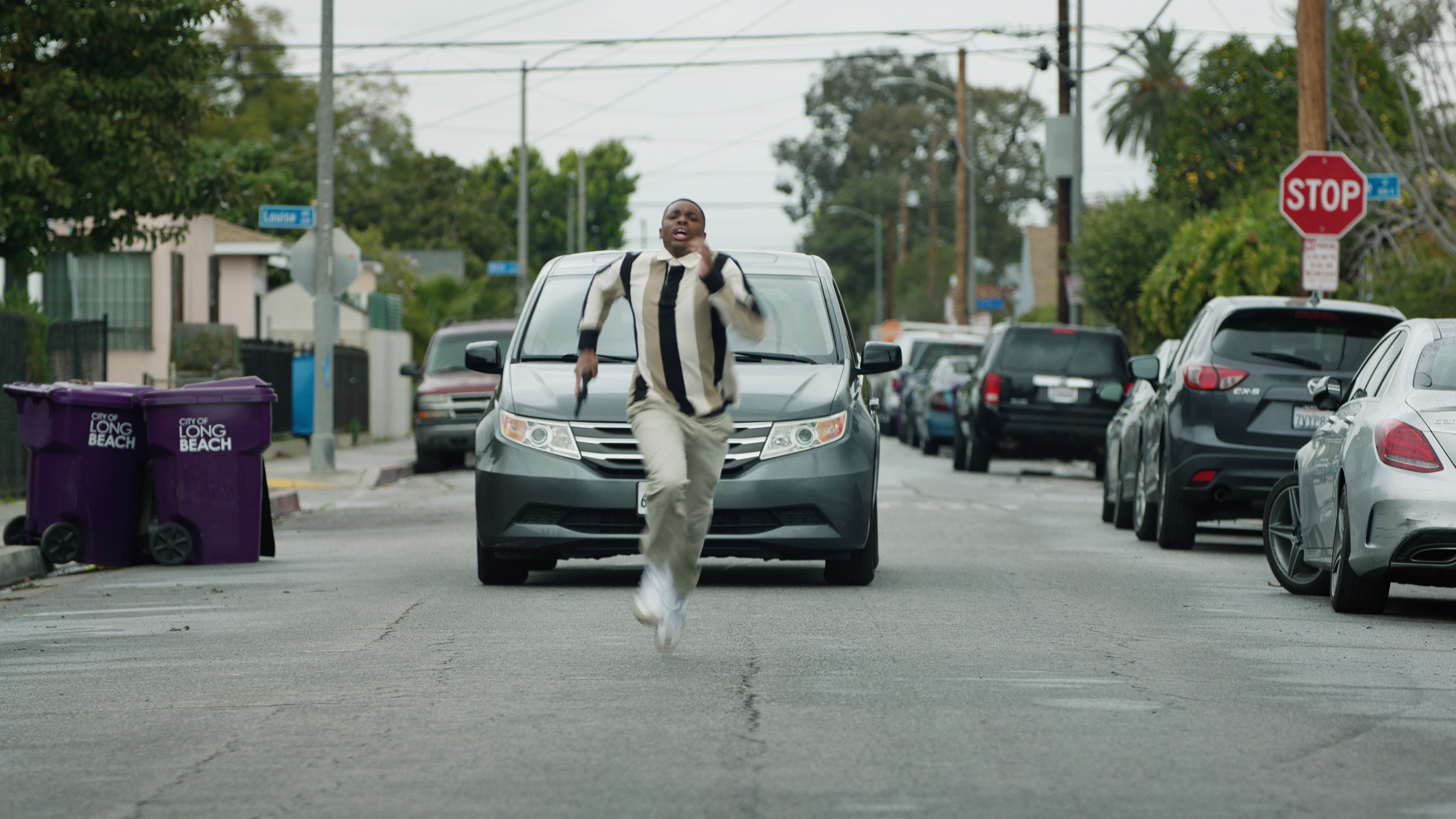
This show has been in the making for a long time. Can you talk about the process of getting a TV show done and why you decided that Netflix was the right place for it?
The process of making a TV show is extremely cumbersome, to say the least. When you have a show in development, you'll take meetings, and it is a meeting and it's another meeting and it just takes forever. This is something I have been trying to do for almost a decade, and to finally get it done was interesting, the process [of it], but to get it done was refreshing. And then you have the production process. That is its own kind of hurdle. So it's really a bunch of restarts. It requires a lot of patience and a lot of commitment, for lack of a better word. So just seeing that it came to fruition, I'm extremely grateful, especially for the people around me.
The Netflix aspect of it just made sense, you know. I knew what I wanted to do was going to be different, not a conventional television structure. So it couldn't go in the box with conventional programming. And you don't want to get to the point to where it's like, “Oh yeah, we tried three episodes. It didn't work, so we're not airing the rest of them.” Netflix, when they make it, if they greenlight it, they are putting it out. And for the [passersby] of Netflix, the people that are actively looking for things, that could feel refreshing. So I feel like it was a perfect place to do something like that.
Kenya Barris was super excited to work on this with you as well. He has been involved in so many groundbreaking TV shows. What did you learn from working with him, and how was that experience?
What I learned the most from working with Kenya, I guess would be the structure and how to navigate it. Him being with ABC and with Netflix and moving through a lot of different major corporations, he kind of had the playbook on how to engage with these people and how to get around some of the hurdles that you might face. I think that was the most important thing. He was cool. He didn't over-impose; he didn't try to make my vision a vision that he would do, which is natural for us to do as people.
If I make music, and you make music. I'm gonna tell you how I make my songs and say, “Well, do it like this.” It takes good leadership to not interact with people in that way because it's extremely hard to see it from their vantage point. And he did a good job at seeing it from my vantage point and knowing what I wanted to create and giving me advice when I needed it and giving me the space to do the rest.
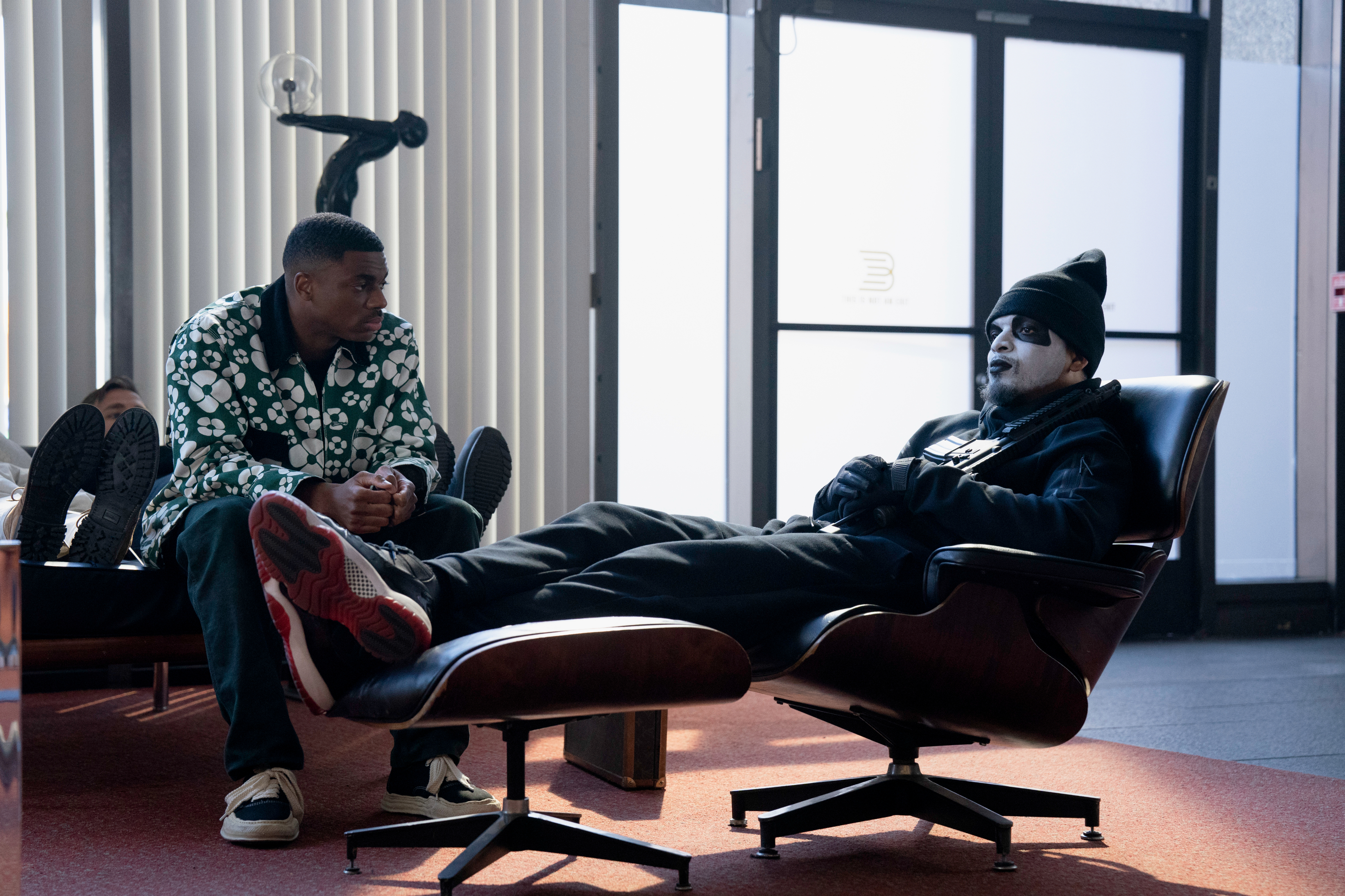
The “Black Business” episode is incredible. You wrote a lot of the episodes, and there’s a line where the banker tells you, “I don’t mean to make you feel small,” and that was the message behind the episode: What happens when people have power and what they do to people. Can you talk about where that idea came from?
Well, I try to take a lot of day-to-day life experiences and had a lot of grander ideas to smaller situations. And with that, we tried to attack capitalism, socialism, class/business dynamics, the banking system, the banking system with connection to slavery, connection to wealth, and crime. A lot of those kinds of things are subplots of that episode. And lean into that monologue specifically.
I've always been a big fan of monologues, and straight-on shots, especially existing within the medium frame or even a wider frame, just to kind of show the depth and the size of kind of the statements in comparison to the world around them. And with that monologue, it was really important that it didn't feel condescending, but it was condescending because the situation is the issue and not necessarily the person delivering it. When you're writing these things, you want to make sure that you have contrast between what you're seeing and what you're hearing, whether you utilize score to do that, whether you utilize cut points. A lot of times people just use reaction shots to kind of gauge how the audience feels. We didn't want to necessarily do that.
We wanted it to feel uncomfortable; certain moments of the show are uncomfortable. We did press earlier, and one of the people interviewing me said, “Yeah, a lot of moments in the show just made me feel uncomfortable; like, OK, what am I watching? Alright, this was funny, but this is dark. This made me feel uncomfortable.” I think that's life. Life always throws things at you that shift your perspective of the world and shift your emotions. And that's something that I wanted to make sure I did. So that scene was important for the growth of the character throughout the episode to showcase that this system, whether this man wants to help him or not, he is not fit for what he's looking for.
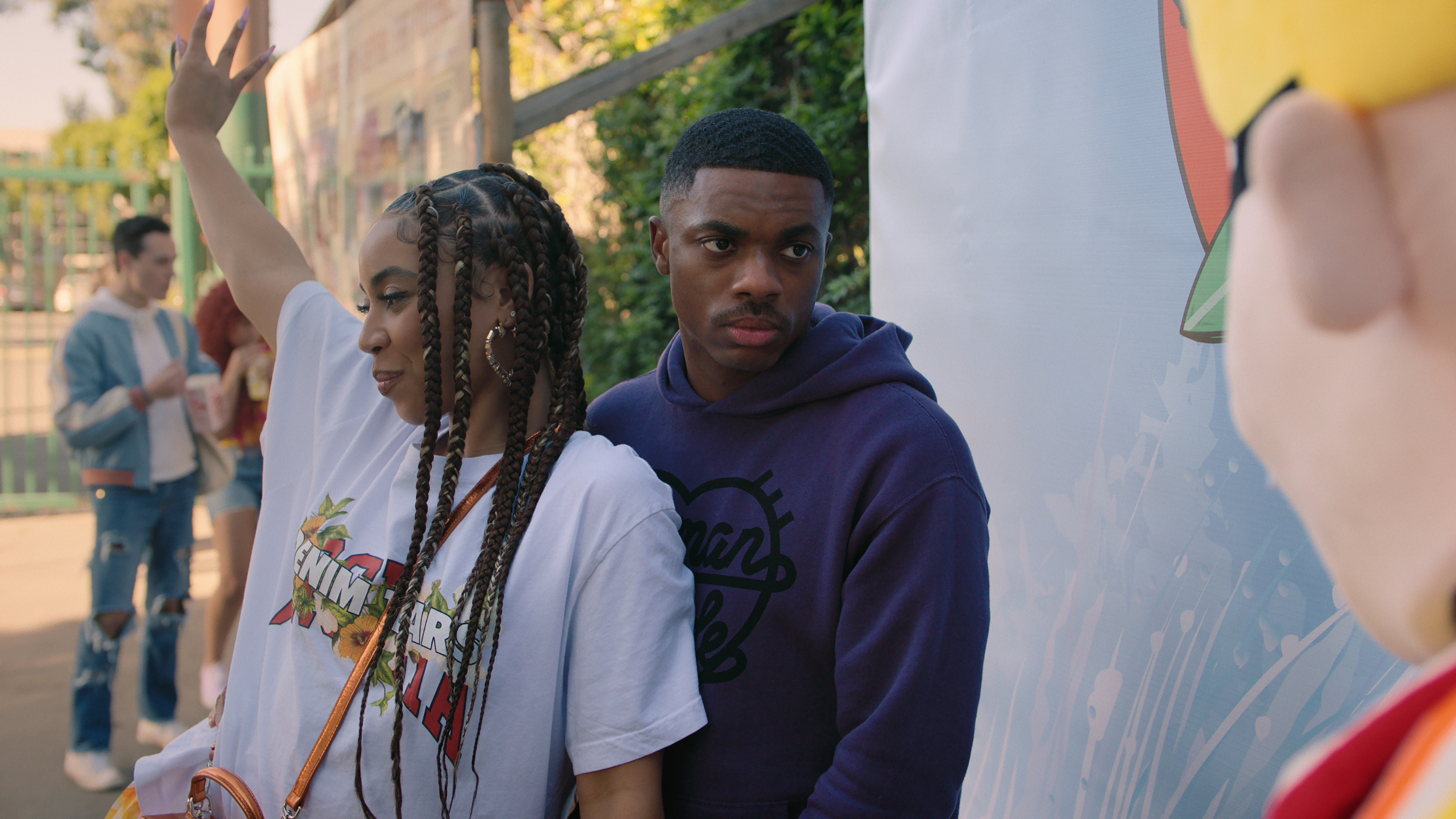
Myles Bullock is incredible in that episode. I also loved Rick Ross in that episode. Vanessa Bell Calloway is incredible. Can you talk about the casting on the show and how you built these characters around you?
I got lucky. I think writing the episodes and being in the production helps a lot because you know the weight of certain scenes and certain words and being able to do little stuff as far as picking the sides that they're reading is extremely important. So when me and the executive producers were selecting people, it was based on not just their look, not their tone of voice, not just who they were, but all of it really, to be honest.
When you pick somebody for a role, you don't give them the context and the nuance of the bigger picture of the show. Sometimes somebody might not have a great read for this specific point, but this part might not matter. Sometimes you have something that is supposed to be heavy, but it's really simple and it's light based on the world around them. But you have to remember the bigger picture when you're casting. There were a lot of people that did great reads, but they couldn't execute the full vision, and I wanted to make sure we have people that had the balance to execute certain things.
Certain people didn't audition like Myles. I brought him in because I knew he would be great for that role. Vanessa Bell Calloway auditioning was crazy to me. Usually, someone of that stature just sends their reels and says, “If you want to hire me, hire me.” When she is of that caliber, we would have hired her just seeing her name there. But the fact that she went and auditioned it showed a lot. I’m extremely grateful for that. I keep saying it because that's out of this world. Like for a first-time show, it is my first time doing everything.
Andrea [Ellsworth] did an amazing job. She knew the nuances, her being local from Los Angeles. She understood the nuance of that position. It's just important to cast with the whole picture in mind because if not, you'll have certain things that fall flat and it'll feel like it's the actor's fault. But not the appropriate direction or the appropriate casting on the production's part. And luckily we had great production and great directors, two great directors.
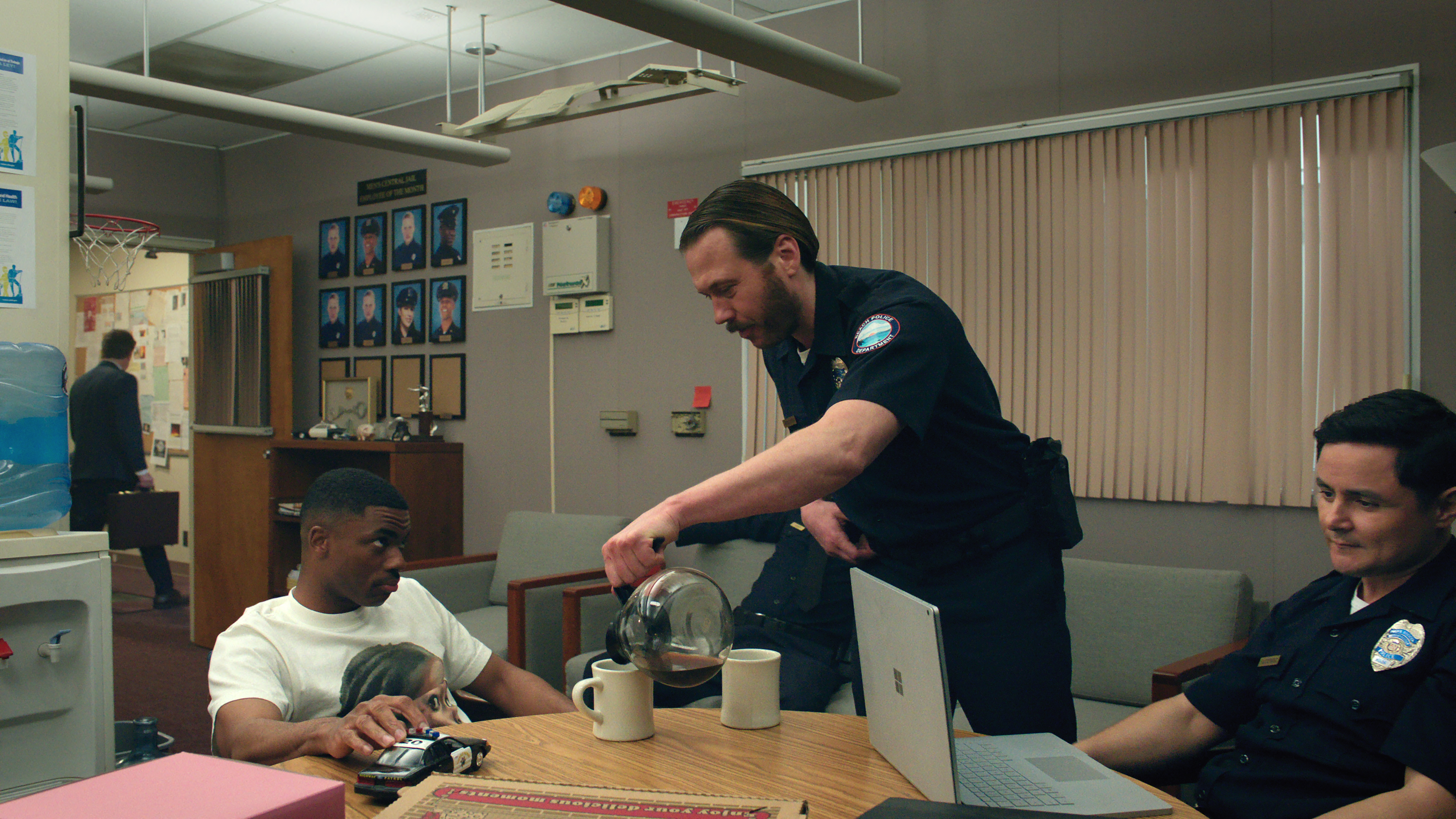
You mentioned the show making people uncomfortable. It reminded me a lot of how I used to feel watching Atlanta. It's funny, but it's also making commentary about society and the world around us. Were there any shows that you watched that you modeled the show after, or did you want to do something completely different?
Of course, you want to do something completely different, but the medium is the medium, right? You're gonna naturally get comparisons. So Atlanta, Dave, things like that, I appreciate those comparisons because those are extremely successful, contemporary shows. I just spoke a lot to Donald [Glover] and fam in general, just about the process. They helped me a lot. But visually, to be 100% honest, my strongest influence would probably be Roy Andersson. Writing-wise, a lot of the Coen brothers' films, especially A Serious Man, had a strong impact on the writing style and dialogue style. I wanted to make sure it was naturalistic, but you don't want it to be too heady.
Visually, outside of our more grandiose shots, I want all the coverage to be similar to animation, like kind of the way that you use the medium wide, the way that you position a frame. So finding a unique way to do a reaction shot, playing with the elements of sound, a lot of it is like The Simpsons. The background sounds, the background movement, orchestration of background actors? David Lynch. As far as creating these voided spaces and walking through these voided spaces with an understanding of the grander space, but still making sure emotionally the place feels small. That way you get kind of a conflict or attention within how the actors are performing. A lot of those things were kind of derivative of those things.
Barry was a big influence. When you're dealing with something big, right? Paper Boi is a fictional rapper, right? When you're dealing with Vince Staples, whatever people's perception of that is, it's going to be there, and you will, for the show to work, it had to be in the background. So you watch Barry and he's a hitman, but it's really about him going to acting class and trying to basically get a new job and have another thing in the background. It's haunting but it's not overbearing. So I took a lot of that with how they utilize that. It's also in Breaking Bad. And it's also in The Andy Griffith Show—probably the strongest one because it takes place with cops in the jail arresting people, and made the cops the good guys, which is hard to do. America-wise, as cops and robbers, we don't necessarily agree with the police in film and television. It's always been our thing—we like outlaws; we like gangsters; we like these things in cinema just in general. So for them to kind of make that feel the way it did, I thought it was very interesting. Twilight Zone, there are a lot of influences.
Yeah, there was also a lot of surrealism for me. Why did you choose to make just five episodes?
I think that's going to help us to get more. I feel like a lot of streamers are doing shorter orders. Just to be honest, you don't see the twenties, the fifteens, the tens anymore. It's like really six to eight and we ended up with five. But I feel like we have the likelihood of getting a second swing at it, and we'll be able to turn around fast.
So I think, especially with our tight group of writing and producing and things of that nature, that five can turn to 10 relatively quickly, as long as people press that little thumbs-up on Netflix. That little thumb matters.
We spoke to Neishea Lemle, the costume designer on the show, and she talked about how you were very specific about wanting to represent Long Beach through the fashion on the show. Why was that important for you?
I wouldn't even necessarily say it's specifically Long Beach. It's just not falling into the idea of how we kind of view ourselves in the world. Everyone's not walking around looking exuberant, everyone doesn't have the finances, and that is what she was trying to do.
But you see a lot of times in television, people either dress really high or really low, and there's no nuance in who people are. So I think individualism was very, very important and understanding that this is a middle-class, lower middle-class environment that is small and kind of off to the side. When I was a kid, I didn't really know—say something as big as like Fairfax or whatever, that's culturally a thing. I didn't know what that was until I was grown, until I had kind of got over there. And even when I was over there, I didn't understand what it was. It was a place where stores were at. When we were kids we were at the mall. We didn't have those kinds of things; we didn't have those experiences.
So it's a little bit different now, but I wanted to make sure that there was dynamic and how the people look, they look like regular people. I didn't want anybody to be too luxurious. I don't want anybody to look like they were in poverty. I wanted it to have a dynamic because in life, sometimes you can be up, sometimes you can be down, and I wanted everyone to kind of reflect that state of limbo that we live in, living in a capitalist society where everybody's pretty much check to check, trying to look and feel their best. I didn't want to feel too high or low.
What would you say to someone who has no idea what this show is about before they watch it? What would you tell them about what kind of ride are they in for?
I would say you have to watch it. I can't really tell them what to compare it to. I feel like it's unique in its own right? But if you love new ideas, you love interesting things, effort, you know, then check out the show. It's not that long. It’s about two hours. We got it—you know, you got it. So, you know, just check it out.
The Vince Staples Show is now streaming on Netflix.

